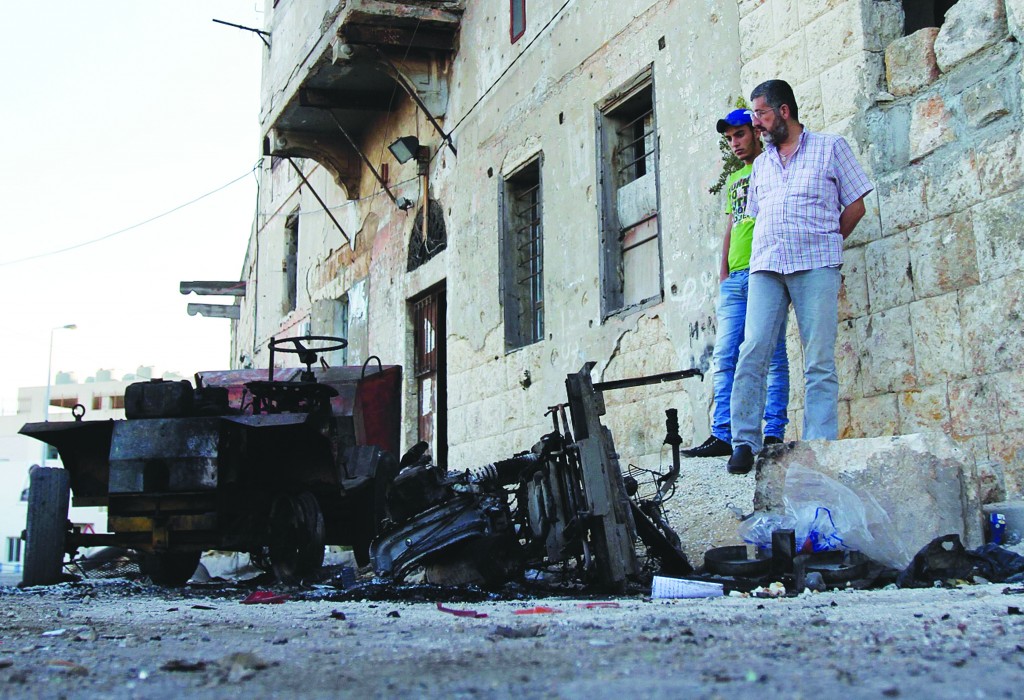Clashes in Lebanon Feed Fear of Syria Spillover

Lebanese supporters and opponents of Syrian President Bashar Assad fired heavy machine guns and lobbed mortar shells at each other Thursday in some of the worst fighting in the port city of Tripoli in years.
The battles raised the five-day death toll to 16 and fed fears that the Syrian civil war would spread to Lebanon and other neighboring countries.
The violence also added to the urgency of U.S.-Russian efforts to bring both sides of the Syrian conflict to a peace conference in Geneva. Members of the Syrian opposition began three-day meetings in Istanbul to hash out a unified position on whether to attend, maintaining that Assad’s departure from power should be the goal of the negotiations.
Lebanon has been on edge since the uprising in Syria began in March 2011. The country, which is still struggling to recover from its own 15-year civil war, is sharply divided along sectarian lines and into pro- and anti-Assad camps. The overt involvement of the Iranian-backed Hizbullah Shiite terrorist group alongside Assad’s regime has sparked outrage among many Sunnis in Lebanon who identify with the overwhelmingly Sunni rebel group fighting to topple Assad.
Deadly sectarian street fighting has erupted on several occasions, mostly in Tripoli, Lebanon’s largest city and a hotbed for Sunni Islamists. This week’s fighting there has been linked to a Syrian regime offensive against the rebel-held city of Qusair in western Syria that has included Hizbullah fighters supporting Syrian troops against the rebels.
Tripoli is overwhelmingly Sunni but has a tiny community of Alawites, members of Assad’s minority sect, which is an offshoot of Shiite Islam.
Residents reported more than six hours of fighting that began late Wednesday and continued through Thursday morning. Mortar shells were used for the first time. Ambulances rushed back and forth transporting casualties to hospitals as officials used mosque loudspeakers to urge citizens to take shelter in basements. Schools and many businesses were shuttered Thursday as sporadic fighting continued.
Five people were killed, pushing the overall death toll to 16 since fighting began Sunday, with 200 people wounded, a security official said, speaking on condition of anonymity in line with military regulations.
Cabinet minister Faisal Karami said the fighting was among the worst in the city since the civil war in Lebanon that ended in 1990, according to comments reported by Lebanon’s state-run National News Agency.
Fighting in Qusair continued for a fifth day Thursday, after Syrian opposition leaders urged rebels from elsewhere to converge on the town, which is strategically important to both sides.
The regime would solidify control in the heavily populated west if it retakes the town, which links the capital Damascus with the Alawite heartland along the Mediterranean coast. For the rebels, predominantly Sunni Qusair is part of a supply line of weapons and fighters from Lebanon.
The Britain-based Syrian Observatory for Human Rights, a pro-opposition group, said Thursday that 46 Hizbullah fighters have been killed in the battle for Qusair. In the past, Hizbullah tried to play down its involvement in the civil war, but its high-profile role in Qusair has made that impossible. Hizbullah has held funerals for fighters who officials close to the group say died at Qusair.
Overall, at least 104 Hizbullah fighters have been killed in Syria in recent months, according to the Observatory, which relies on a network of sources in Syria.
Hizbullah’s growing involvement has prompted international condemnation. European officials said Wednesday that the European Union is reassessing whether to declare Hizbullah a terrorist organization, a move it has long shied away from despite pressure from the U.S.
Kerry on Thursday acknowledged the difficulties of launching peace talks. “Nobody has any illusions about how difficult, complicated, what a steep climb that is,” he said during a visit to Israel.
“But we also understand that the killing that is taking place, the massacres that are taking place, the incredible destabilization of Syria, is spilling over into Lebanon, into Jordan, and has an impact, obviously, on Israel,” he said.
This article appeared in print on page 2 of edition of Hamodia.
To Read The Full Story
Are you already a subscriber?
Click "Sign In" to log in!

Become a Web Subscriber
Click “Subscribe” below to begin the process of becoming a new subscriber.

Become a Print + Web Subscriber
Click “Subscribe” below to begin the process of becoming a new subscriber.

Renew Print + Web Subscription
Click “Renew Subscription” below to begin the process of renewing your subscription.









